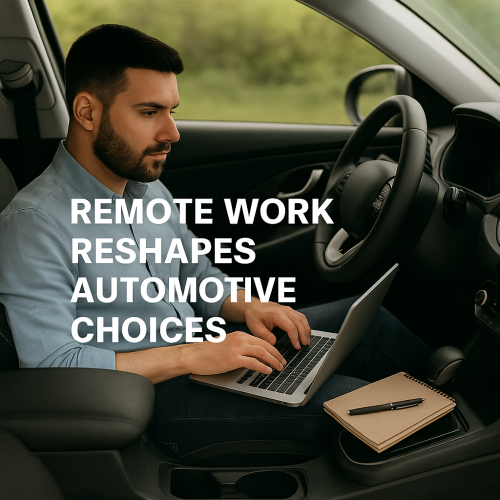How Working from Home Is Transforming Car Buying Preferences
Remote Work Reshapes Automotive Choices. As remote work becomes a lasting part of modern life, its influence extends far beyond how people do their jobs — it’s transforming how they buy cars. The traditional view of vehicles as mere commuting tools is evolving. Today, professionals are seeking cars that double as mobile offices — equipped for both productivity and relaxation.
This growing shift is changing how consumers shop and how dealerships adapt, creating new opportunities in the automotive industry.
The Rise of the Mobile Office
With flexible and hybrid work now the norm, cars have become more than transportation — they’re an extension of the home office. Remote professionals increasingly look for vehicles that offer comfort, functionality, and connectivity.
Features like spacious cabins, ergonomic seating, soundproof interiors, and built-in Wi-Fi have become top priorities. Cars with quiet cabins, wireless charging, and large touchscreens are in high demand, as drivers seek a peaceful space for calls or short work sessions between meetings.
Automakers are responding with smart interiors that resemble productive workspaces, ensuring drivers can stay connected and comfortable wherever they go.
Luxury and Comfort Take the Wheel
Remote work has also fueled a preference for comfort and luxury. With commuting costs reduced, many professionals are investing in premium vehicles that enhance both relaxation and status.
Cars are now viewed as sanctuaries — places to unwind, think, and recharge. Heated seats, high-quality sound systems, and advanced driver-assistance features are among the most requested amenities.
This trend has pushed automakers to incorporate luxury-grade features into mainstream models, blending technology, comfort, and elegance for everyday users.
A New Dynamic in the Car Market
Remote Work Reshapes Automotive Choices. The remote work era has also reshaped overall car demand. Fewer daily commutes mean less need for compact commuter cars and more interest in multipurpose vehicles that support remote lifestyles.
Sales of electric and hybrid vehicles are rising, driven by sustainability goals and the flexibility remote workers have to charge at home. Meanwhile, a smaller supply of used cars — combined with global production slowdowns — has increased prices across the market.
Dealerships are adapting by focusing on digital retail experiences, offering virtual showrooms, online price transparency, and remote consultations that make car buying more convenient than ever.
The Electric and Hybrid Shift
For many remote professionals, working from home encourages eco-friendly habits — and their car choices reflect that. Hybrid and electric vehicles offer cost savings and environmental benefits, making them ideal for those who drive less but still value sustainability.
Hybrid cars offer flexibility for longer trips, while EVs are perfect for those who can easily charge at home. As charging infrastructure expands, more remote workers are transitioning to electric vehicles, accelerating the shift toward greener mobility.
What This Means for Dealerships
To stay competitive, dealerships are rethinking how they connect with customers. Online sales, digital showrooms, and home-delivery options are no longer extras — they’re expected.
By offering virtual test drives, online financing, and remote paperwork, dealerships can meet modern buyers where they are — at home. This approach improves convenience and builds trust with tech-savvy consumers who expect seamless online experiences.
Remote Work Reshapes Automotive Choices. Driving Change
The remote work revolution has changed how people view cars — from tools of necessity to spaces of comfort and productivity. As remote professionals seek vehicles that balance technology, comfort, and eco-friendly design, the automotive industry must continue to evolve.
The future of car buying is digital, flexible, and experience-driven. Dealerships that adapt to these remote work trends will be best positioned to serve the next generation of connected, comfort-focused buyers.

